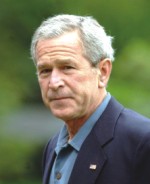| Perspective
Paul Wolfowitz
An Academic who Destroyed a Country
Syed Badrul Ahsan
 |
Wolfowitz --spreading the big lie. |
Good men everywhere will be delighted that Paul Wolfowitz has finally had his comeuppance. He is one individual who ought not to have scaled the heights that he already has. No, it is not his neo-conservatism that we question. What we do is something more basic, which is we try to look at the kind of man Wolfowitz is. Of course, he is like any other. It is just his attitude which has worried people for a pretty long time now. He was, as we recall, American ambassador to Indonesia and that was in the Suharto years. That must have been a good time for him, for after the chaos of September 1965, when as many as a million Indonesians were murdered by the Indonesian army in the name of a crackdown on communist plotters, Americans have always enjoyed themselves on the long beaches of a country made up of a thousand islands.
There is a good deal of irony when you reflect on Wolfowitz. He used to be an academic, which in another way is to suggest that from him you expected behaviour that would leave human life everywhere enriched to a certain degree. Today, as a disgraced Wolfowitz prepares to make his exit from the World Bank, we know only too well how even academics can push men and women to the edge of disaster, indeed into the depths of unmitigated misery. There were, lest you have had cause to forget, quite a few apparently sophisticated, seemingly urbane Bengali academics who did not flinch from helping the Pakistan army pick off many of our good men as a way of ensuring the survival of their Islamic republic in this resurgent Bengali land. Wolfowitz may not have exactly prepared a list of men to be dispatched, but he did outline some rather sinister plans on how Iraq could be made to bite the dust. He was certainly not alone in doing that. There were Cheney, Rumsfeld, Perle and so many others to goad him along. It was Wolfowitz who spread the big lie that Saddam Hussein had huge stockpiles of weapons of mass destruction and so needed to be taken out. Four years after the framing of that lie, there are no such weapons seen. Iraq is a destroyed country, its legitimate government gone forever and Saddam Hussein, a man whom Donald Rumsfeld was happy to meet in an earlier era, is dead through a gross miscarriage of justice. Wolfowitz thought millions of grateful Iraqis would turn out on the streets of Baghdad to greet his country's soldiers as liberators. Today, it is Iraqi insurgents who make life a nightmare for young American soldiers who do not know what they are doing in a foreign country. It is something of a déjà vu. Back in the 1960s, 58,000 American soldiers died in Vietnam without really understanding what their presence in a poor country in Asia was all about.
 |
In Iraq, Bush and Wolfowitz together enacted a newer version of the old drama (Vietnam). |
It was Lyndon Johnson and Robert McNamara who muddied the waters in Vietnam. In Iraq, it was George W. Bush and Paul Wolfowitz who enacted a newer version of the old drama. By 1967, McNamara began to see the pointlessness of a conflict he had thought America would triumph over. He turned, from being an advocate of the war into a growing pessimist. When he left in 1968, President Johnson, for reasons we still do not know, made sure that he became president of the World Bank. McNamara stayed there for thirteen years. And there lay the irony. A man who had destroyed a poor country was now being expected to help poor societies around the world give themselves a better quality of life. When, therefore, Wolfowitz began feeling that certain, loud stirring in the heart which says wars devoid of a moral base are not to be won, that Iraq was starting to be a hard nut to crack, he chose to leave the corridors of office. President Bush, reluctant to have his ally condemned to sudden obscurity, ended up doing an LBJ. He sent Wolfowitz to the World Bank, to do the job Robert McNamara did once. The shadow of Iraq, therefore, linked up with the bygone darkness of Vietnam to create a new, decidedly sordid legacy at the bank. The message was not to be missed: it was all right for some men who had destroyed the future of nations not theirs to end up providing leadership to a Bretton Woods institution. There was something of an absence of ethics here. When a particular stage of your life is spent contemplating the many ways through which societies you do not approve of can be put to the torch, you treat the rest of the world with contempt.
Wolfowitz treated the more unfortunate regions of the world with contempt. The contempt lengthened and in time turned into an affair we now know as Shaha Riza. As demands rose for Wolfowitz to resign, he decided that disdain was what his detractors deserved. It was classic neo-conservatism coming into play. He had done nothing wrong. He was, in so many words, staying the course. And then, in ways typical of neo-conservatism, he did not stay the course. His humiliation is complete. Whether or not he has been humbled enough to begin treating the world with some respect is an attitude he has not demonstrated yet.
Copyright
(R) thedailystar.net 2007 |
|
